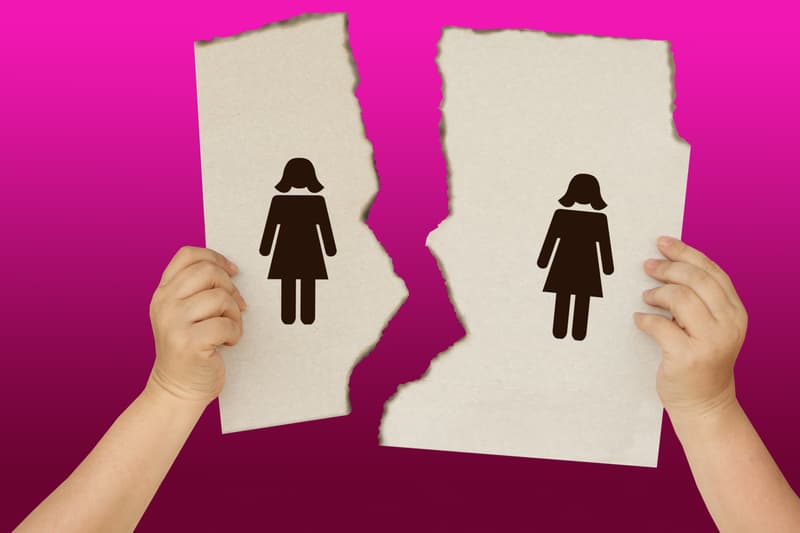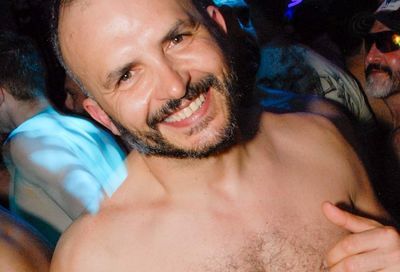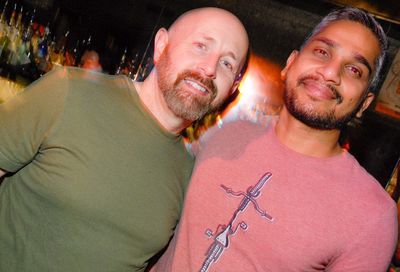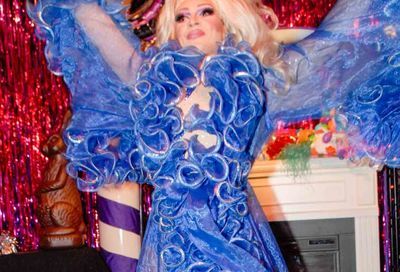'Will & Grace' Shall Set You Free
Prop 8 defense lawyers point to sitcoms and Barney Frank to prove gays don't face discrimination in society
SAN FRANCISCO – Attorneys defending Proposition 8 in a federal district court tipped their hand Wednesday on how they will try to show that allowing same-sex couples to marry might harm the institution of marriage. And it’s all about the attitudes of gay men toward monogamy.
According to the line of questioning developed by defense attorney Nicole Moss during her cross-examination of one of the plaintiffs’ expert witnesses, gay men are less inclined than heterosexuals to value and insist upon monogamy in a relationship. And that, say attorneys for gay legal groups which are being forced to watch the case unfold from the sidelines, will almost certainly translate into an argument by the defense that allowing gay men to marry will erode society’s commitment to marriage as a special relationship and its value to the security of children.
There were other points made Wednesday. Attorneys challenging Proposition 8 had UCLA psychologist Letitia Peplau review studies that suggested that marriage improves the stability of same-sex relationships, benefits the children of same-sex couples, and does no harm to heterosexual marriages.
”It’s just hard for me to imagine,” said Peplau, ”that you could have a happily married couple say, ‘Well, I guess we’d better throw in the towel [on their happy marriage] because Adam and Stuart down the block got married.”
Plus, noted Peplau, the numerical impact of same-sex marriages compared to heterosexual marriages in this country would amount to only about one to three percent.
”And the idea that a group of American citizens want to enter into an institution and keep it vibrant and alive seems like that would be a good thing,” said Peplau.
But on cross-examination, Moss challenged Peplau to cite ”empirical studies” that showed domestic partnerships and civil unions could not offer the same benefits of marriage.
”There’s no question that domestic partnerships have been an improvement” for same-sex couples, said Peplau, ”but they are not equivalent for variety of reasons and do not infer all the benefits of marriage.”
”They don’t confer all the benefits of marriage,” said Moss, ”but you can’t say that the aspects they don’t confer is what is responsible” for the ways marriage benefits the health of an individual.
”I have great confidence,” said Peplau, who was clearly experienced and comfortable on the witness stand, ”that some of things that come with marriage, as a first-class kind of relationship that this society most values, undoubtedly confers benefits that are not part of a domestic partnership.”
Moss questioned Peplau at length about studies that indicated gay men were less committed to monogamy than heterosexuals and lesbians. She did so by asking Peplau about a study Peplau had helped author 25 years ago in which she said that, among some gay male couples, ”sexual exclusivity may be the exception rather than the rule.”
”There are a number of things that are different now,” said Peplau. ”It was really a different time.”
”Still, the fact is that fewer gay men believe sexual monogamy is important, compared to lesbians and heterosexuals,” said Moss, noting that the study had indicated 74 percent of gay men in a ”closed relationships” had said they had had sex with at least one other person outside the relationship.
Peplau conceded the point but added that many heterosexuals also ”pledge to be monogamous and are not.”
Non-monogamy, said Peplau, is ”not always infidelity or a breach of trust.” And with gay men, she said, there is often a clear understanding that the relationship does not have to be sexually exclusive.
Kate Kendall, executive director of the National Center for Lesbian Rights, said the line of questions was probably aimed at showing that same-sex relationships ”are not as valuable and authentic and that our ‘marriages’ would cheapen and debase the institution.”
Even the lowest level of judicial scrutiny – rational — requires that there be some need for a law. And Jenny Pizer, head of Lambda Legal Defense’s National Marriage Project, agreed that the questions about gay male non-monogamy were probably trying to lay a foundation for an argument that Proposition 8 prevents the erosion of monogamy as an accepted feature of marriage.
Showing that the law is based on something other than hostility will be important for defendants, said Pizer. Previous case law has said that if a law expresses hostility or is an aim to do harm the courts much ”look more deeply at the reasons” given to explain the need for that law.
The audacity of hate
Attorneys defending Proposition 8 tried to make a case Wednesday for the notion that people could support the ban on same-sex marriage without feeling hostility toward gay people.
Quoting from President Obama’s book The Audacity of Hope, defense attorney David Thompson noted that Obama had written, ”I believe that American society can choose to carve out a special place for the union of a man and a woman as the unit of child rearing most common to every culture.” He then asked the plaintiffs’ expert witness on gay history and discrimination, George Chauncey of Yale University, whether that statement reflected ”moral disapproval of gays and lesbians.” Chauncey expressed reluctance to answer the question, so Thompson put it another way: ”Is it possible to have a position [against same-sex marriage] and not morally disapprove of gays and lesbians?”
Chauncey allowed that it was ”possible.” He also allowed that colonial-day laws prohibiting sodomy were ”not the same as anti-gay discrimination.”
Thompson’s cross-examination also sought to disqualify gays as a ”suspect class” — or, roughly speaking, a minority that has little political power and suffers discrimination based on a trait they cannot change. He introduced evidence to suggest the political, legal, and cultural landscape for gay people is much better today than it was in decades past. And he sought to illustrate that gay people have very powerful political allies, though Chauncey’s responses to his questions did not always confirm the response Thompson apparently sought.
Thompson asked Chauncey whether the gay community has a ”powerful ally” in U.S. House Speaker Nancy Pelosi. Chauncey asked him what he meant by ”powerful ally.” Thompson said ”a champion for their cause.”
”I’m not sure I would agree,” said Chauncey. He noted there had been a number of important pieces of legislation sought by the community that Pelosi has not brought to the floor. ”Some would question how powerful an ally” she is, said Chauncey.
Thompson pointed to openly gay U.S. Rep. Barney Frank, one of the House Democrats highest-ranking leaders. Chauncey said that Frank is powerful but that he has his critics in the gay community.
Thompson also tackled religious bias against gay people. He showed videotape of evangelical minister Rick Warren saying that he supported Proposition 8 but believes ”in loving everybody.” In the news interview, Warren said he just opposed ”redefining marriage” but ”absolutely believes in showing respect to everybody regardless of lifestyle.”
In responding to the Warren videotape, Chauncey noted Warren’s choice of words — such as ”regardless of lifestyle” — signaled that he didn’t consider gay relationships equal to heterosexual relationships.
Finally, Thompson referred to numerous writings and comments within the LGBT community where some have expressed their dissatisfaction with the idea of marriage as an institution and their reluctance to have the community make marriage equality a high priority of the LGBT civil rights movement.
On her re-direct of Chauncey, San Francisco attorney Therese Stewart had Chauncey explain how the gay movement in its early years did not focus on marriage in large part because it was focused on trying to stop everyday violence against gays and police raids on bars, while trying to secure non-discrimination laws in housing and the workplace.
Stewart asked Chauncey whether some African Americans, in fact, opposed desegregation during the black civil rights movement. Chauncey said there had been such debates, often concerned with fears about ”pushing the white power structure too far.
Day four of the trial begins at 8:30 Pacific time Thursday.
© 2010 by Keen News Service.
Support Metro Weekly’s Journalism
These are challenging times for news organizations. And yet it’s crucial we stay active and provide vital resources and information to both our local readers and the world. So won’t you please take a moment and consider supporting Metro Weekly with a membership? For as little as $5 a month, you can help ensure Metro Weekly magazine and MetroWeekly.com remain free, viable resources as we provide the best, most diverse, culturally-resonant LGBTQ coverage in both the D.C. region and around the world. Memberships come with exclusive perks and discounts, your own personal digital delivery of each week’s magazine (and an archive), access to our Member's Lounge when it launches this fall, and exclusive members-only items like Metro Weekly Membership Mugs and Tote Bags! Check out all our membership levels here and please join us today!























